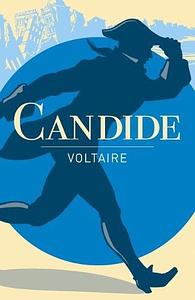Take a photo of a barcode or cover
"What is this optimism?" [...] "It is the madness of maintaining that everything is right when it is wrong."
"It is demonstrable that things cannot be otherwise than they are [...] Consequently they who assert that all is well have said a foolish thing, they should have said all is for the best."
"Candide" remains one of my favorite reads for the simple fact that amid the greatest range of horrors life can present, Pangloss (and eventually Candide) embraces an unflinching optimism generally reserved for the overwhelmingly naïve and characters in musicals. However, Pangloss' particular brand of madness is not the result of naïveté, but the result of a Buddhist-like acceptance of what is. For Pangloss, "que sera, sera" is not the "throw the hands up, throw the towel in" mantra of one who no longer cares or relinquishes any desire for control. Instead, Pangloss' optimism is an existentialist exercise in reinterpreting one's personal history to suss out purpose and promise. Genius. It's the only way to live without regrets--because "all is for the best."
"It is demonstrable that things cannot be otherwise than they are [...] Consequently they who assert that all is well have said a foolish thing, they should have said all is for the best."
"Candide" remains one of my favorite reads for the simple fact that amid the greatest range of horrors life can present, Pangloss (and eventually Candide) embraces an unflinching optimism generally reserved for the overwhelmingly naïve and characters in musicals. However, Pangloss' particular brand of madness is not the result of naïveté, but the result of a Buddhist-like acceptance of what is. For Pangloss, "que sera, sera" is not the "throw the hands up, throw the towel in" mantra of one who no longer cares or relinquishes any desire for control. Instead, Pangloss' optimism is an existentialist exercise in reinterpreting one's personal history to suss out purpose and promise. Genius. It's the only way to live without regrets--because "all is for the best."
adventurous
funny
lighthearted
fast-paced
Plot or Character Driven:
A mix
Strong character development:
Yes
Loveable characters:
No
Diverse cast of characters:
Complicated
Flaws of characters a main focus:
Complicated
adventurous
funny
fast-paced
“Neither you need tell me, said Candide, “that we must take care of our garden.”
qué LIBRAZO. quedé tiesa. mucho en qué pensar.
qué LIBRAZO. quedé tiesa. mucho en qué pensar.
fast-paced
Skaičiau kiek kitą vertimą, bet manau, kad istorija yra šios knygos žvaigždė.
Kaip prieš 270 metų Volteras apibūdino žmones, taip ir dabar girdžiu apibūdinamus. Mes pykstamės, ginčijamės, kovojame vieni su kitais lygiai taip pat, kaip tai darė knygos visuomenė.
Tikiuosi niekada nepajusti tokio gyvenimo, kokį turėjo Kandidas, bet norėčiau patirti meilę, kuri mane stums į priekį, privers perkeliauti senąjį ir naująjį pasaulį.
Tikiuosi niekada nepatirti tokių fizinių kančių, kaip Panglosas, bet noriu taip išlaikyti savo idealus.
Visuomenė per tą laiką pasikeitė neatpažįstamai, bet individų savybės, aprašytos knygoje, išliko. Tikrai įsivaizduoju, kad viską galima perkelti iš XVIII a. Europos į šių laikų pasaulį. Šalutinius veikėjus tektų pakeisti į dabartinius, bet labai daug patirčių galima pasilikti.
Kaip prieš 270 metų Volteras apibūdino žmones, taip ir dabar girdžiu apibūdinamus. Mes pykstamės, ginčijamės, kovojame vieni su kitais lygiai taip pat, kaip tai darė knygos visuomenė.
Tikiuosi niekada nepajusti tokio gyvenimo, kokį turėjo Kandidas, bet norėčiau patirti meilę, kuri mane stums į priekį, privers perkeliauti senąjį ir naująjį pasaulį.
Tikiuosi niekada nepatirti tokių fizinių kančių, kaip Panglosas, bet noriu taip išlaikyti savo idealus.
Visuomenė per tą laiką pasikeitė neatpažįstamai, bet individų savybės, aprašytos knygoje, išliko. Tikrai įsivaizduoju, kad viską galima perkelti iš XVIII a. Europos į šių laikų pasaulį. Šalutinius veikėjus tektų pakeisti į dabartinius, bet labai daug patirčių galima pasilikti.
reflective
adventurous
dark
funny
lighthearted
reflective
fast-paced
funny
sad
medium-paced
Plot or Character Driven:
Plot
Strong character development:
No
Loveable characters:
No
Diverse cast of characters:
No
Flaws of characters a main focus:
No
Voltaire obviously took a dim view of the value of human life.
The story follows the globe-trotting misadventures of a naive commoner, Candide, and his quest to marry the beautiful Cunegunde, who is the daughter of a Baron. His compatriots include the philosophers Pangloss ("We live in the best of all possible worlds! Everything is for the good!") and Martin ("Everybody is miserable and always will be"), the faithful sidekick, Cacambo, and the one-buttocked old woman (How did she lose a buttock? Read the book!) .
The characters endure the worst suffering the world has to offer: war, the Inquisition, people being mutilated, eaten, burned alive, hanged, sold into prostitution and galley slavery, con men, thieves, you name it. Yet somehow they convince themselves that life is worth living. Candide at one point finds himself in the mythical South American paradise El Dorado, yet leaves because he is troubled by dissatisfaction. He feels, in order to be happy, the need to lord his newfound wealth over others less fortunate.
The characters end the story on a farm, seeking a moderate contentment through hard work which keeps them from thinking overmuch about their condition. Reading this book makes me feel pretty good, actually. As pessimistic as I sometimes am, I find much more satisfaction in life than Voltaire seems to.
The story follows the globe-trotting misadventures of a naive commoner, Candide, and his quest to marry the beautiful Cunegunde, who is the daughter of a Baron. His compatriots include the philosophers Pangloss ("We live in the best of all possible worlds! Everything is for the good!") and Martin ("Everybody is miserable and always will be"), the faithful sidekick, Cacambo, and the one-buttocked old woman (How did she lose a buttock? Read the book!) .
The characters endure the worst suffering the world has to offer: war, the Inquisition, people being mutilated, eaten, burned alive, hanged, sold into prostitution and galley slavery, con men, thieves, you name it. Yet somehow they convince themselves that life is worth living. Candide at one point finds himself in the mythical South American paradise El Dorado, yet leaves because he is troubled by dissatisfaction. He feels, in order to be happy, the need to lord his newfound wealth over others less fortunate.
The characters end the story on a farm, seeking a moderate contentment through hard work which keeps them from thinking overmuch about their condition. Reading this book makes me feel pretty good, actually. As pessimistic as I sometimes am, I find much more satisfaction in life than Voltaire seems to.





